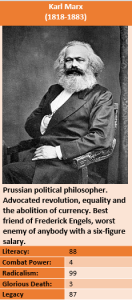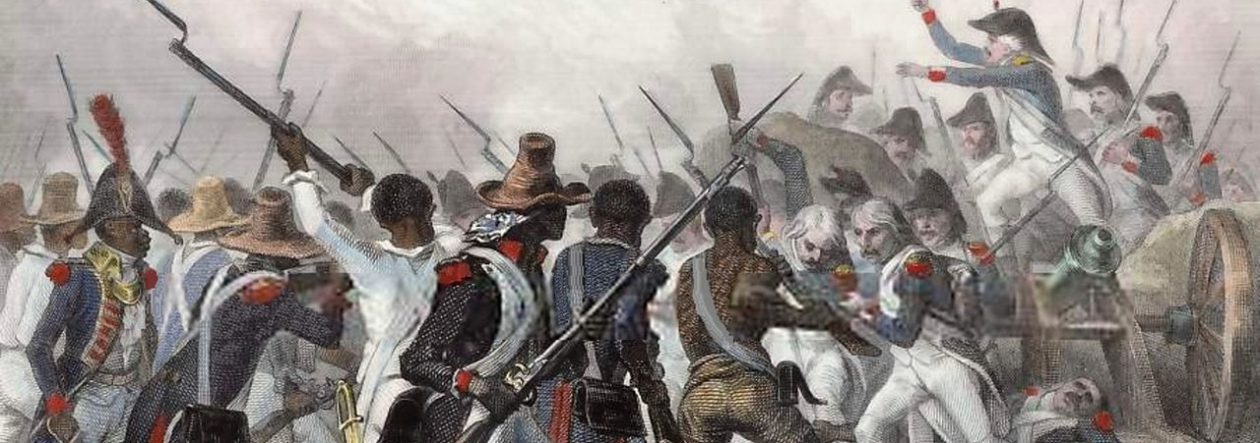by Ben Macready
 Of all the figures discussed in these articles thus far, Karl Marx is without a doubt the most Revolutionary. Marx believed that Revolution was both fundamentally essential and inevitable to the progress of human society. He anticipated that eventually the workers of the world would realise they ‘have nothing to lose but their chains’ and revolt against the industrialists and capitalists who covertly controlled their lives. (1) In the aftermath of the Revolution, a new global ‘Communist’ society would be created, where all would be equal regardless of their wealth, status or nationality. Concepts such as nations and currency would, in fact, be abolished in the new world order. Marx is seen by some as a visionary and the father of the modern welfare state, and by others as a deluded utopian – whose well-meaning but impractical ideas have been the cause of much global suffering. Marx’s legacy is therefore difficult to assess, as though the impact he has left upon history is clear, he remains a deeply divisive figure, both loved and hated by many. Whatever polarised views they may hold of him, there are few historians who are apathetic towards Marx.
Of all the figures discussed in these articles thus far, Karl Marx is without a doubt the most Revolutionary. Marx believed that Revolution was both fundamentally essential and inevitable to the progress of human society. He anticipated that eventually the workers of the world would realise they ‘have nothing to lose but their chains’ and revolt against the industrialists and capitalists who covertly controlled their lives. (1) In the aftermath of the Revolution, a new global ‘Communist’ society would be created, where all would be equal regardless of their wealth, status or nationality. Concepts such as nations and currency would, in fact, be abolished in the new world order. Marx is seen by some as a visionary and the father of the modern welfare state, and by others as a deluded utopian – whose well-meaning but impractical ideas have been the cause of much global suffering. Marx’s legacy is therefore difficult to assess, as though the impact he has left upon history is clear, he remains a deeply divisive figure, both loved and hated by many. Whatever polarised views they may hold of him, there are few historians who are apathetic towards Marx.
Born in Trier (Prussia), Marx was the son of a lawyer and read philosophy as well as law (the latter at his father’s instance) at several different universities. Marx would later migrate from Prussia. He moved across Europe, settling a number of intellectually vibrant cities: in Paris, Brussels, Cologne and finally London. His nomadic life style was motivated by a desire to escape censorship and the pursuit of the authorities who were displeased with him and the revolutionary ideology he increasingly espoused. He ultimately settled in Britain, due to the nation’s greater leniency in terms of censorship than other European states. The life of a revolutionary activist was not a lucrative one, however, and Marx frequently relied on his lifelong friend and co-author Frederick Engels to provide him with money. During his education, Marx was particularly inspired by the thinking of Georg Wilhelm Friedrich Hegel. Hegel saw society as evolving through stages. Each era, Hegel believed, was defined by two contradictory sets of ideas, which later scholars would dub ‘thesis’ and ‘antithesis’. These two opposing ideals would ultimately come together to produce ‘synthesis’ and thus bring an advance to a next stage. This next stage would, in turn, be defined by a new thesis and antithesis.
Marx drew on Hegel to describe history as evolving through a series of stages, though Marx saw the struggling of social classes, rather than opposing ideas, as the driving force of history. Prior to the development of society, Marx states that humans existed in a state of ‘Primitive Communism’. Hunter-gatherer communities, Marx asserts, were based upon sharing and egalitarian principles, which became lost as time marched forward and societies developed. Whether or not this vision of hunter-gatherers living in communal cooperation is accurate is a matter of debate amongst historians. The vision served to justify Marx’s idea of the inevitability of communism in the future. Marx’s presentation of hunter-gatherers as proto-Communists allowed him to argue that Communism was man’s natural form of existence, that we will all eventually be able to return to once the ‘unnatural’ presence of Capitalism has been removed. Moving forward from ‘Proto-Communism’, Marx argued that man then began to settle into ‘Ancient Societies’. The birth of society led to the formation of class struggle, which became more pronounced as wealth and ownership of labour and property became more stratified.
Marx’s analysis proposed that the working classes or the ‘proletariat’ were still just as oppressed under the capitalist ‘bourgeoisie’ at the end of the eighteenth century as earlier slaves or serfs had been under feudal systems. He also asserted that capitalism is fundamentally self-destructive and that it results in cycles of exponentially increasing prosperity and decline. Eventually, once the workers of the world become aware of their potential they will overthrow the capitalist system, through the means of revolution, and establish an international Communist society.
Marx’s two most famous, and most impactful books, are the Communist Manifesto and Das Kapital. The Manifesto was published in 1848, not coincidentally the year of several social and political revolutions across Europe. The Manifesto served to codify the precepts of Communism and the Marxist view of history. His ideas were written in an accessible format, that could be distributed and understood by a wide audience, thus spreading the seeds of revolution across Europe – beginning with the famous definitive line, ‘the history of all hitherto existing societies, is the history of class struggle.’(2) Whereas the Communist Manifesto was a book largely about politics and history, the unfinished Das Kapital was a book on economics, and a rebuttal, on Marx’s part, to those who called him a utopian – attempting to provide a mathematical demonstration of how Capitalism was fundamentally unstable relative to the alternative of Communism. (3)
The impact and legacy of Marx’s ideas cannot be overstated – many of them initially taken up by his fellow writer Engels and then innumerable radicals and theorists. Most importantly, they persuaded communities of labourers under pressure because of the industrialisation of workplaces to identify together and pursue unionised action to challenge rampant exploitation. Institutions such as the National Health Service, as well as many amenities and forms of welfare such as pensions and reasonable working hours simply would not exist. Marx’s ideals encouraged people to defend their civil rights and to campaign for equal treatment in the face of adversity or discrimination. Marx played a central part in creating a more egalitarian world, and modern workers would have significantly fewer liberties, and be forced to work in significantly worse conditions in a world without him.
At the same time, however, several historians find fault in Marx for his advocacy of violence. His belief that revolution was the only way to secure the ideal future, and that any means can be employed, in the attempt to establish Communism, have come under scrutiny. The Communist Manifesto, for instance, states that Communists should ‘openly declare that their ends can be attained only by the forcible overthrow of all existing social conditions’ and that ‘the ruling classes’ should ‘tremble at Communistic revolution.’(4) Marx’s fervour here explains the repressive nature of many Communist societies which have existed in the past. Writing in the context of the Soviet Union, Peter Holquist states that violence became invested with a ‘redemptive and purifying significance’, as state sponsored use of force could be justified through Marx’s ideals. (5) Marx’s vilification of the bourgeoisie ensured that victims of repression in Communist societies could be presented as counter revolutionaries or enemies of the people, giving an ideological pretext to the suppression of their rights.
Marx’s ideas have thus demonstrated both the best and worst aspects of human nature and the Age of Revolution. Showing that man can be giving and selfless, yet also brutal and unforgiving. Whether the inevitable Communist revolution Marx prophesised ultimately comes to pass, or remains forever intangible, his ideas have undoubtedly changed the world.
- Karl Marx and Frederick Engels, Manifesto of the Communist Party, 1848 – reprinted in 2010, p.34
- Ibid p.14
- Karl Marx and Frederick Engels, Das Kapital, 1867, Reprinted by Pacific Publishing Studios in 2010 p.22
- Marx, The Communist Manifesto, p.34
- Peter Holquist, Making War, Forging Revolution Russia’s Continuum of Crisis: 1914-1921, 2002, p.287
Further Reading
Karl Marx and Frederick Engels, Manifesto of the Communist Party
Robert Service, Comrades! A History of World Communism
Kieran Allen, Marx and the Alternative to Capitalism
